八年级英语下册unit9复习
邯郸市第一中学初中英语八年级下册Unit 9知识点复习(含解析)

一、选择题1.Have you ever ______ pyramids in Egypt?A.heard of B.heard from C.heard D.listened to A解析:A【解析】【详解】句意:你听说过埃及的金字塔吗?heard of听说,heard from收到某人的来信,heard听见,listened to听。
根据宾语pyramids in Egypt可知此处表示听说过埃及的金字塔,故选A。
2.--Yunnan is very beautiful.I there last year.--Yes,it's very beautiful.I there twice.A.went;have gone B.went;have beenC.have gone;went D.have been;went B解析:B【解析】句意:——云南非常漂亮。
我去年去了那里。
——是的,它非常漂亮。
我去过那里两次。
第一空根据last year可知用一般过去时,故用went。
第二空根据twice可知表示去了那里,又回来了,故用have been to。
故选B。
点睛:have been to表示去过,去了又回来了;have gone to表示去了,去了还没有回来。
第一空根据last year可知用一般过去时,故用went。
第二空根据twice可知表示去了那里,又回来了,故用have been to。
故选B。
3.—Have you ever tried food in Singapore?—Yes.______ you like Indian food, Western food ______ Japanese food, y ou’ll find it all in Singapore.A.Either;or B.Neither;nor C.Both;and D.Whether;or D解析:D【解析】句意:——你曾经尝试过新加坡的食物吗?——是的,无论你喜欢印度食物,西方的食物还是日本的食物,你将在都在新加坡找到它。
人教版八年级下册英语Unit 9单元语法知识点总结

人教版八年级下册英语Unit 9单元语法知识点总结本单元重点短语的具体用法1. at night:在夜晚。
例如:I usually go to bed at night.(我通常在夜晚睡觉。
)2. in a more natural environment:在一个更加自然的环境中。
例如:We can enjoy the beauty of nature in a more natural environment.(我们可以在一个更加自然的环境中欣赏大自然的美丽。
)3. all year round:一年到头;终年。
例如:The flowers bloom all year round in this garden.(这个花园里的花一年到头都开放。
)4. be far from:离……远。
例如:The school is far from my home.(学校离我家很远。
)5. in the dark:在黑暗中。
例如:I can't see anything in the dark.(我在黑暗中什么也看不见。
)6. in the past:在过去。
例如:Life was very different in the past.(过去的生活非常不同。
)7. have been to sp.:去过某地。
例如:I have been to Beijing many times.(我去过北京很多次。
)8. science museum:科学博物馆。
例如:We visited the science museum last weekend.(我们上周末参观了科学博物馆。
)9. history museum:历史博物馆。
例如:The history museum has many interesting exhibits.(历史博物馆有很多有趣的展品。
)10. amusement park:游乐园。
例如:We had a great time at the amusement park.(我们在游乐园玩得很开心。
八年级英语下册Unit_9_Have_you_ever_been_to_museum_讲解+练习题目+答案

Unit9 知识点和练习附详细参考答案1. invent(1)invent 作动词,意为“发明;创造”。
例如:Edison invented the light bulb. 爱迪生发明了电灯。
(2)invent还可以表示“虚构”。
例如:The whole story was invented. 整个故事是虚构的。
(3)invent的名词形式有两个,一个是inventor(发明者;发明家),另一个是invention (发明物)。
例如:Edison is a great inventor in history.爱迪生是历史上伟大的发明家。
Human history is also a history of great inventions.人类的历史也是一个伟大发明的历史。
【拓展】invent和discover的辨析:(1)invent 意为“发明,发明之物”指“从无到有”。
例如:Alexander Graham Bell invented the telephone in 1876.亚历山大•格雷厄姆•贝尔在1876年发明了电话。
(2)discover 意为“发现”,指“本来就已经存在,但不为人知”的事物。
例如:Columbus discovered America in 1492. 哥伦布在1492年发现了美洲。
2. unbelievableunbelievable作形容词,意为“难以置信的;不真实的”,是由believable“可相信的;可信任的”加否定前缀un-派生而来的。
其动词形式为believe,意为“相信;以为”。
例如:It's unbelievable that you are a writer. 我难相信你是一个作家。
【拓展】un-是个前缀,意为“不”。
例如:happy“高兴的”— unhappy“不高兴的”;lucky“幸运的”— unlucky“不幸的”;important“重要的”— unimportant;“不重要的”;healthy“健康的”— unhealthy“不健康的”。
人教版八年级英语下册Unit 9单元复习题(含答案解析)
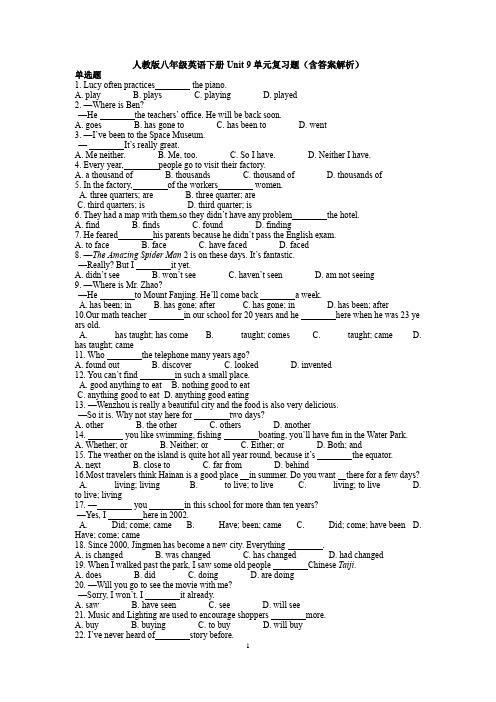
人教版八年级英语下册Unit 9单元复习题(含答案解析)单选题1. Lucy often practices the piano.A. playB. playsC. playingD. played2. —Where is Ben?—He the teachers’office.He will be back soon.A. goesB. has gone toC. has been toD. went3. —I’ve been to the Space Museum.—It’s really great.A. Me neither.B. Me,too.C. So I have.D. Neither I have.4. Every year,people go to visit their factory.A. a thousand ofB. thousandsC. thousand ofD. thousands of5. In the factory,of the workers women.A. three quarters;areB. three quarter;areC. third quarters;isD. third quarter;is6. They had a map with them,so they didn’t have any problem the hotel.A. findB. findsC. foundD. finding7. He feared his parents because he didn’t pass the English exam.A. to faceB. faceC. have facedD. faced8. —The Amazing Spider Man2is on these days.It’s fantastic.—Really?But I it yet.A. didn’t seeB. won’t seeC. haven’t seenD. am not seeing9. —Where is Mr.Zhao?—He to Mount Fanjing.He’ll come back a week.A. has been;inB. has gone;afterC. has gone;inD. has been;after10.Our math teacher in our school for20years and he here when he was23ye ars old.A. has taught;has comeB. taught;comesC. taught;cameD. has taught;came11. Who the telephone many years ago?A. found outB. discoverC. lookedD. invented12. You can’t find in such a small place.A. good anything to eatB. nothing good to eatC. anything good to eatD. anything good eating13. —Wenzhou is really a beautiful city and the food is also very delicious.—So it is.Why not stay here for two days?A. otherB. the otherC. othersD. another14. you like swimming,fishing boating,you’ll have fun in the Water Park.A. Whether;orB. Neither;orC. Either;orD. Both;and15. The weather on the island is quite hot all year round,because it’s the equator.A. nextB. close toC. far fromD. behind16.Most travelers think Hainan is a good place in summer.Do you want there for a few days?A. living;livingB. to live;to liveC. living;to liveD. to live;living17. —you in this school for more than ten years?—Yes,I here in2002.A. Did;come;cameB. Have;been;cameC. Did;come;have beenD. Have;come;came18. Since2000,Jingmen has become a new city.Everything.A. is changedB. was changedC. has changedD. had changed19. When I walked past the park,I saw some old people Chinese Taiji.A. doesB. didC. doingD. are doing20. —Will you go to see the movie with me?—Sorry,I won’t.I it already.A. sawB. have seenC. seeD. will see21. Music and Lighting are used to encourage shoppers more.A. buyB. buyingC. to buyD. will buy22. I’ve never heard of story before.A. so an interestingB. such an interestingC. so interestingD.such interesting23. He to Beijing many times.A. have beenB. has beenC. have goneD. has gone24. There are five foreigners.Two boys are ;three girls are .A. German ; IndiansB. German ; IndiansC. Germen ; IndianD.Indians ; Japanese25. You can come here and play with us you’re free.A. whateverB. whereverC. howeverD. whenever二、完形填空Have you ever been to Beijing, the capital of China?The Greens have been to two of the greatest cities in the world. One is Beijing, and 26is Paris.The Greens 27 in Beijing for half a month 28 the summer vacation. They enjoyed 29 there. They’ve been to many great places. 30 thefirst two days, they went to Tian’anmen Square. It is very large and there were many people31 photos there. Next, they went to Beihai Park. They 32 boating there and hada boat race with other visitors. They had a great time there. The Great Wall is one of the 33places of interest in the world. They spent the whole day 34 the Great Wall. There wereso many people on the Great Wall. The Greens felt very 35 and they took lots of pictures there!How beautiful Beijing is! They will go to Beijing again next summer!The London Eye is a tourist attraction in London, the UK. There you can get into a capsule (密封地) to enjoy a great view of the city of London.I visited the London Eye last summer 36 a friend. My friend didn’t know37 we were going. I just told him we would go somewhere very special. As we arrived at Waterloo Station, he had worked out where we were going. He smiled 38 . When we reached theLondon Eye, there was a very long waiting line, so in order to save time, he stayed in the line while I went to buy the 39 .The capsule doesn’t completely 40 when people get on, so you have to get into it quickly. Then the door of the capsule 41 . The view was wonderful. We took many photos of the view and of ourselves. It 42 about half an hour for the capsule to go around.If you are interested in going there, I’d like to give you some 43 . To enjoy the view, go in the 44 . There are night rides, but you won’t see a lot. Sometimes the top of the wheel can be quite 45 even though it’s sunny. So ladies, don’t forget to take a scarf.26. A. other B. another C. the other D. others27. A. has gone B. has been C. have gone D. have been28. A. to B. during C. at D. with29. A. them B. oneself C. themselves D. himself30. A. To B. During C. After D. Before31. A. to take B. takes C. taking D. took32. A. go B. went C. have gone D. going33. A. more famousB. famousC. most famousD. the most famous34. A. visit B. visiting C. visited D. to visit35. A. excited B. exciting C. tired D. tiring三、阅读理解 Bookstores are second homes for readers. Although many people can now buy books online, manyreaders still like the feeling in bookstores. They can touch(触摸) the books and smell the print.In China, there are many special bookstores. Sanlian Taofen Bookstore became the first 24-hour bookstore in Beijing at the beginning of April. Popular Holdings in Shanghai is a film-themed bookstore.It has film books and posters. Eslite Bookstore in Taiwan often has activities like talks with famous writers.At the same time, bookstores outside China can be very colorful, too. Scarthin Books is a small bookstore in the UK. It sells new and second-hand books.There are more than 100,000 books lying on the shelves of the store’s 12 rooms. Bart ’s Books in the US is a good place to enjoy the sunshine(光) while reading books. It’s an outdoor bookstore. Bookshelves are on the street. When the store is closed, people can still buy books. They just put money into the door’s coin box. Where can you find a cafe, bar and bookstore in just one place? The answer is probably El-Pendulo in Mexico. Books line (排列成行) the walls of the store. On the second floor, visitors can order everyday meals in the cafe and drinks from the bar. In order to keep cool, there are green plants and trees inside. Does it look like apark?46. special bookstores inside China are mentioned(提到) in the passage.A.2B.3C.5D.647. Scarthin Books is .A.a 24-hour bookstoreB.an outdoor bookstoreC.in the USD.small48. People can still buy books at when it’s closed.A.Bart ’s BooksB.Popular HoldingC.Eslite BookstoreD.El Pendulo49. Readers can at El Pendulo .A.talk with famous writersB.order mealsC.enjoy the sunshineD.buy film posters50. There are inside El Pendulo in order to keep cool.A.12 roomsB.bookshelvesC.green plants and treesD.coin boxesOne day an American called Simon went to London to visit his friend , Rick. Rick told him that his flat was on the first floor. When he arrived , Simon went straight to the first floor of the building.But he was told that there was no Rick on that floor. Do you know why?In fact , the British call the first floor of a building the ground floor. The floor above the ground floor is the first floor , which Americans would call the second floor.The story shows that there are a few culture differences between Britain and America , though the British and Americans both speak English.36. A. for B. with C. atD. from 37. A. how B. when C. whatD. where 38. A. happily B. slowly C. quicklyD. carefully 39. A. foods B. drinks C. ticketsD. papers 40. A. arrive B. stop C. buildD. run 41. A. breaks B. knocks C. leavesD. closes 42. A. took B. spent C. useD. waste 43. A. time B. plans C. adviceD. freedom 44. A. zoo B. daytime C. sunD. night 45. A. dirty B. hot C. dryD. coolThe British usually hide their feelings.They seldom start a conversation with strangers.For exa mple,on the train the British often spend their time reading newspapers or books.But American s are quite different.They’re more active and easier to talk with.The British and Americans may use different terms for many things.The British usually use fo otball,eraser and mail while Americans prefer to use soccer,rubber and post.51. Simon went to London to.A.visit his friendB.spend his holidayC.study EnglishD.have a meeting52. Which picture shows us where Rick’s flat was?A.B. C. D.53. According to the passage,the British usually spend their time on the train.A.playing cardsB.talking loudlyC.doing some readingD.singing and dancing54. What does the underlined word“terms”mean in Chinese in the passage?A.成果B.学期C.会议D.用语55. What’s the best title for the passage?A.Differences in CultureB.Simon’s Funny Storyrmation AbroadD.Hiding the Feelings四、翻译根据汉语意思完成句子56. 他一年到头总是很忙。
八年级下册人教版英语Unit 9 重点语法及练习题
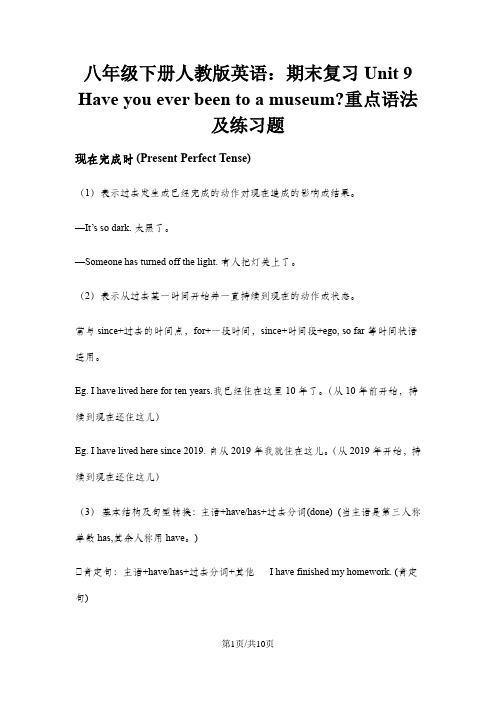
八年级下册人教版英语:期末复习Unit 9 Have you ever been to a museum?重点语法及练习题现在完成时(Present Perfect Tense)(1)表示过去发生或已经完成的动作对现在造成的影响或结果。
—It’s so dark.太黑了。
—Someone has turned off the light.有人把灯关上了。
(2)表示从过去某一时间开始并一直持续到现在的动作或状态。
常与since+过去的时间点,for+一段时间,since+时间段+ego,so far等时间状语连用。
Eg.I have lived here for ten years.我已经住在这里10年了。
(从10年前开始,持续到现在还住这儿)Eg.I have lived here since2019.自从2019年我就住在这儿。
(从2019年开始,持续到现在还住这儿)(3)基本结构及句型转换:主语+have/has+过去分词(done)(当主语是第三人称单数has,其余人称用have。
)①肯定句:主语+have/has+过去分词+其他I have finished my homework.(肯定句)①否定句:主语+have/has+not+过去分词+其他I have not finished my homework.(否定句)①一般疑问句:Have/Has+主语+过去分词+其他—Have you finished your homework?—Yes,I have./No,I haven’t,(一般疑问句及肯定、否定回答)(4)has gone(to),has been(to),has been(in)的区别Have/Has gone(to):去了(现在不在说话现场)Eg. ---Where is your father?---He has gone to Shanghai.Have/Has been(to):去过(已不在去过的地方)Eg.My father has been to Shanghai.Have/has been in:呆了多久(还在所呆的地方)Eg.My father has been in Shanghai for two months.=My father has been in Shangha i since two months ago.(5)现在完成时的标志:①常与just,already,yet,ever,never,before,so far等连用,强调动作的完成,不强调动作的持续。
八年级英语下册 Unit 9 重点词组

八年级英语下册 Unit 9 重点词组1. have been to 到过某处(现在已回来)Have gone to 到某处去了(现在还没有回来) Have been in/at 在某处呆了多久2. an amusement park 游乐园3. a water park 水上公园4. a roller coaster 过山车5. see sb. doing sth. 看见某人正在做某事see sb. do sth. 看见某人做了某事6. walk around 四处走动7. take a ride 兜风8. on board 在船上9. take different routes 走不同的路线10. end up with sth 以…结束end up doing sth 以做某事结束11. argue with sb. 与某人争吵12. an English-speaking country 说英语的国家13. an exchange student 交换生14. a flight attendant 一名机组乘务员15. a tour guide 导游16. such as 例如For example例如(后用逗号隔开)17. listening skills 听力技能18. in Southeast Asia 在东南亚19. take a holiday 度假20. three quarters 四分之三21. have problems (in) doing sth. 做某事很费劲22. during the daytime = in the day 在白天23. all year round 全年,一年到头24. wake up 醒来,唤醒,叫醒25. think about/of doing sth 思考做某事26. so much fun如此多的乐趣27. welcome to 欢迎来到28. be welcomed by受到…欢迎29. think about 考虑30. think of 想起;认为31. rather than 宁可;而不是32. neither…nor…既不…也不…33. on the one hand,…on the other hand,…. 一方面…,另一方面…。
英语八年级下册unit9知识点

英语八年级下册unit9知识点Unit9的主题是“Do you want to go to a movie?”,主要学习的是谈论你的喜好和接受或拒绝邀请的表达方式。
以下是Unit9的知识点总结。
一、句型结构1.询问对方的喜好Do you like…?What do you think of…?2.表达喜好I like…I love…I’m crazy about…It’s my favorite.3.接受邀请Sure, I’d love to.That sounds great/good. I’d be happy/pleased to.4.拒绝邀请I’m sorry, but I can’t. I’m afraid I have to…Maybe another time.二、词汇1.电影genresaction movie 动作片comedy 喜剧drama 剧情片horror movie 恐怖片2.电影院cinema/movie theater3.邀请及回应invite and response Would you like to…? 你想要……吗?Can you…? 你能……吗?Do you want to…? 你想……吗?四、语法1.比较级和最高级形容词和副词在表示比较的时候,需要使用比较级和最高级。
从以下三个方面来比较:一般比较:as + 形容词/副词 + as比较级:形容词/副词 + er + than最高级:the + 形容词/副词最高级 + 名词2.情态动词情态动词可以用于表达建议、请求、命令、许可等意思。
can 可以could 能够may 可以might 可能should 应该shall 将will 意愿would 意愿五、表达技巧1.巧用缩略词在口语中,使用缩略词表达更为简洁。
I’d like to = I would like to = I wanna2.注意语调和语气语气是表达意图的关键所在,我们需要通过语调和语气来准确表达自己想要表达的情感。
Unit9单元讲义人教版八年级英语下册

Unit9 Have you ever been to a museum?单词短语及重点句型一、单词讲解1 somewhere adv.在某处;到某处somewhere 不定副词,意为“某地”。
go somewhere different 意为“去与众不同的某地,去某个独特的地方”。
I want to go somewhere different and live alone. 我想去一个与众不同的地方独自生活。
拓展:由some, any, no, every分别加上where构成的副词叫不定副词。
即:somewhere 某个地方, anywhere 任何地方, nowhere 无处,哪里都不, everywhere 每个地方。
2 invent v.发明;创造1)invent 作动词,意为“发明;创造”。
Edison invented the light bulb. 爱迪生发明了电灯。
2)invent还可以表示“虚构”。
The whole story was invented. 整个故事是虚构的。
3)invent的名词形式有两个,一个是inventor(发明者;发明家),另一个是invention(发明物)。
Edison is a great inventor in history. 爱迪生是历史上伟大的发明家。
辨析:invent和discover的辨析:①invent 意为“发明,发明之物”指“从无到有”。
Alexander Graham Bell invented the telephone in 1876. 亚历山大•格雷厄姆•贝尔在1876年发明了。
②discover 意为“发现”,指“本来就已经存在,但不为人知”的事物。
Columbus discovered America in 1492. 哥伦布在1492年发现了美洲。
3 unbelievable adj.难以置信的;不真实的unbelievable作形容词,意为“难以置信的;不真实的”,是由believable“可相信的;可信任的”加否定前缀un派生而来的。
八年级英语u9知识点
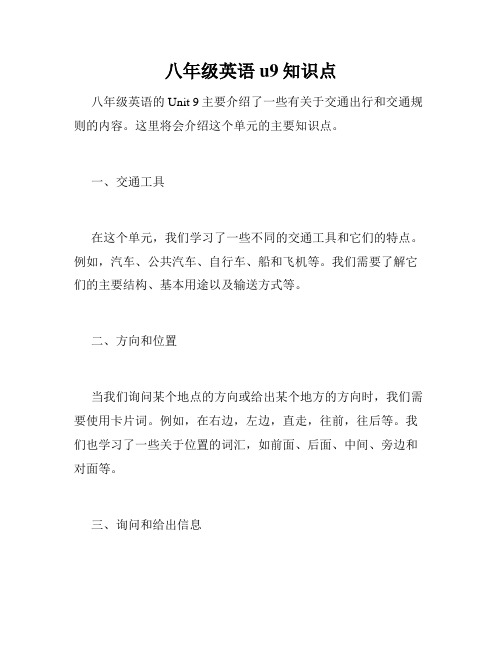
八年级英语u9知识点
八年级英语的Unit 9主要介绍了一些有关于交通出行和交通规则的内容。
这里将会介绍这个单元的主要知识点。
一、交通工具
在这个单元,我们学习了一些不同的交通工具和它们的特点。
例如,汽车、公共汽车、自行车、船和飞机等。
我们需要了解它们的主要结构、基本用途以及输送方式等。
二、方向和位置
当我们询问某个地点的方向或给出某个地方的方向时,我们需要使用卡片词。
例如,在右边,左边,直走,往前,往后等。
我们也学习了一些关于位置的词汇,如前面、后面、中间、旁边和对面等。
三、询问和给出信息
在交通出行中,询问方向、地点和其他相关信息非常重要。
因此,在这个单元,我们学习了一些有关如何有效地进行信息交流
的语言表达方法。
例如,如何向他人提问和回答问题,如何描述
位置,如何提供和请求帮助等。
四、指示词和冠词
在描述交通工具、位置和方向时,我们需要使用指示词和冠词。
这些词语能够帮助我们更清楚地表达意思,如this、that、these、those、a、an和the等。
五、交通规则
学习关于交通规则是出现意外事故和确保人身安全的关键。
在
这个单元里,我们学习了一些常见的交通规则,如穿过马路时如
何确保自己的安全,如何识别交通标记等等。
总结
通过学习这个单元,我们可以更好地了解有关交通出行及其相关信息的表达方法,同时学习了如何提供和请求帮助,如何保障自己的人身安全以及关于交通规则的知识。
这些知识点不仅适用于英语学习,也将对我们的日常生活有所帮助。
人教版八年级下册英语 Unit9 知识清单含练习

Unit9 Have you ever been to a museum?I、词性转换1.amusement. n.娱乐,游戏→amusing. adj.娱乐的2.invent. v.发明→invention. n.发明→inventor. n.发明家,发明者3.believe. v相信,认为可能→→unbelievable. adj不可思议的,不敢相信的→unbelievably. adv不可思议地4.rapid. adj.快速的→rapidly. adv.快速地,迅速地5.usual. adj.通常的,寻常的→usually. adv.寻常地,通常地→unusual. adj.不寻常的,异样的,有异常的6.encourage. v.鼓励→encouraging. adj.鼓励的,鼓舞的,刺激的→courage. n.勇气7.social. adj.社会的,社交的→society. n.社会8.peace. n和平,宁静→peaceful. adj和平的,宁静的→peacefully. adv和平地,宁静地9.performer. n表演者,演员→perform. v表演→performance. n表演10.collect. v.收集→collection. n.收集11.safe. adj.安全的,无危险的→safety. n.安全12.simply. adv.仅仅,不过→simple. adj.简单的13.India. n.印度→Indian. adj.印度人,印度的,印度语的14.Japan. n.日本→Japanese. adj.日本的,日本人的,日语的15.most. adj.大多数,大部分的→mostly. adv.大部分地,主要地16.locate. v. 定位,坐落于→location. n.位置,坐落17.nation. n.国家→national. adj.国家的,名族的→nationality. n.名族,国籍international. adj. 国际的II、短语搭配1.at night 在晚上2.all year round 一年到头,终年3.be far from 离......远4.in the dark 在黑暗中5.in the past 在过去6.learn about sth 了解有关.....的情况7.on the weekend 在周末8.put up 搭建,张贴9.in such a rapid way 以如此速猛的方式10.different kinds of 各种各样的11.thousands of 数以千计的12.three quarters 四分之三13.have problems /trouble / difficulty (in ) doing sth 做某事有困难14.during the daytime 在白天15.a couple of times 好几次16.right now 现在,目前17.walk around 到处走18.hear of 听说19.take a ride 兜风20.encourage sb. to do sth 鼓励某人做某事21.on the one hand....on the other hand 一方面,另一方面III、语法总结⑴ have been to _________________________⑴have gone to_________________________⑴ have been in_________________________分数的表达1).结构: a).分子用基数词,分母用序数词.分子(基数词) 1分母(序数词) 4 =one fourth = one quarterb).当分子大于1时,分母为序数词加s.¾ = three fourths = three quarters2).注意:分数词的几种特殊形式.1/3—one third = a third 1/4—one fourth = a quarter1/2—one second = a half 3/4—three fourths = three quarters3).分数词作主语时, 谓语动词根据分数词后面的名词来确定.不可数名词+动词单三形式分数+ of +可数名词+ 动词变复数形式1.I want to go to the t . Where is the bathroom?2.I do some sports after school. M basketball, sometimes football.3.i don’t like traveling by air because I have a f of flying.4.Now people hardly buy c anymore because phones can take photos,too.5.It’s not s to swim alone in the river.6.I first started to c stamps at the age of 4.7.I lost one of my earrings. But I’m sure it’s s in this house.8.S is the season when all kinds of flowers start to come out.9.It’s very quiet and p here in the woods. We can only hear the birds singing and flying.10.We are going to the theatre. And the evening’s p will begin at 8:00pm.11.I want to thank everyone who has e me and supported(支持) me.12.Alexander Graham Bell i the telephone in 1876.13.Everywhere the superstar goes, he gets t of fans waiting for him in the airport.14.David is always the first to come to school. It’s u for him to be late.15.Henan P has the largest population in China.16.I think the dishwasher(洗碗机) is a wonderful i to help people live an easier life.17.The teacher is very happy because her students have made great p in English recently.18.W she wins or loses, this is her last chance.19.We face a lot of s problems today such as low pay and high house price.20.This afternoon, three G visited our school.\1.I have never been Hongkong before.2.Sam has gone Yunnan. He will be back in a week.3.David lives in Hangzhou now. He’s been Hangzhou since 2011.4.------This is Jack. May I speak to Linda?------Sorry, Jack. Linda (go) to the cinema.5.------How long has Mr. Green lived in China?------ four years.6.You helped me a lot. You can eat food for free in my restaurant (when) you like.7.She asks we will go shopping on Saturday morning or not.8.I like traveling and I want to work a tour guide.9.Lily’s father has a large (collect) of tea sets.10.The book (it) is so helpful that everyone likes it.11.The bad news goes (rapid) from mouth to mouth.12.It’s easy to save the tree, you (simple) have to cut off the dead parts.13.------I have never tried warm spring before.------ have I. Let’s book two tickets and try tomorrow.14.Watching the tea (prepare) is just as enjoyable as drinking the tea itself.15.Singapore is a good place (practice) your English.16.I have visited several places of interest summer vacation.17.My teacher often encourages me (read) more English magazines.18.About two (three) of the workers are women. The rest are men.19.Kunming is 1,800 kilometers far Nanjing.20.London Zoo is the (interesting) zoo I have ever visited.Jane is a warm-hearted girl. She is only ten years old, but she has big ideas of helping other kids.Jane took part in a winter camp 1. __________ the age of eight. During her stay in the camp, she went to visit some kids in poor areas. She felt sad that the kids there didn't have new clothes to wear and 2. __________ (toy) to play with. After she returned home, she kept thinking about 3. __________ to do to help those kids.One morning, Jane saw some elder kids 4. __________ (sell)lemon juice by the street. They wanted to raise money to help their friends. Then she came up with 5. __________ idea.6.__________ the help of her mother, Jane set up her first lemonade stand(摊位). In a week, it made $52.7.__________ it was only a little money, she helped 12 kids with it! She felt very excited when she saw smiles on 8. __________ (they) faces.After that, her mother helped her start a program called Jane's Lemonade for Love. Up to now, she has already raised 9. __________ (many) than $17,000! She is going to spend the money on clothes, toys and books 10.__________ the poor kids.Robert Lee grew up in New York. Because his family wasn’t ___16___, he learned from a young age that it’s important to cut down on food waste. ____17____ he was at school, he joined a student group to deliver leftover to people ____18____ homes. This experience made him ____19____ how serious the problem of food waste was.After ____20____ school, Lee and a friend started a club called Rescuing Leftover Cuisine. Its ___21___ is to get unsold food from restaurants and deliver it to people who need food. The members take the leftover food from restaurants around the city and ____22____ it to those in need.Lee and his team make an APP ____23____ for the club. Restaurants use it to give them the ____24____ about how much leftover food they have each day. Then members get the food and give it out. Lee’s club is a(n)____25____ now. He and his team have delivered over 150,000 kilos of food, ____26____ almost 300,000 meals to people who need them.Lee just does a(n) ____27____ thing but he has really improved the ____28____ of people around us. But Lee says that ___29___ work isn’t over. “It is ___30___ the beginning. The need is so great that we need to do a lot more.”16.A.big B.small C.poor D.rich17.A.Though B.While C.Until D.After18.A.at B.by C.without D.over19.A.decide B.agree C.understand D.remember20.A.passing B.visiting C.checking D.leaving21.A.decision B.purpose C.address D.standard22.A.give B.lend C.add D.save23.A.safely B.widely C.especially D.quietly24.A.advice B.reason C.answer D.information25.A.dream B.success C.comfort D.event26.A.serving B.cooking C.selling D.buying27.A.easy B.sad C.little D.bad28.A.lives B.plan C.safety D.health29.A.my B.their C.our D.your30.A.even B.also C.just D.again。
英语八年级下册U9知识点
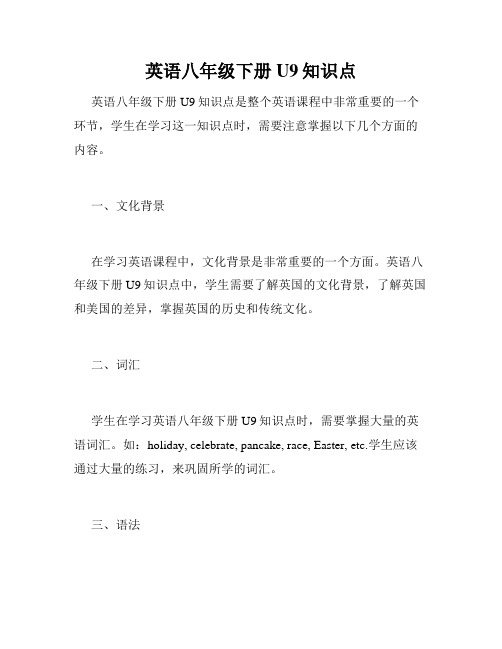
英语八年级下册U9知识点英语八年级下册U9知识点是整个英语课程中非常重要的一个环节,学生在学习这一知识点时,需要注意掌握以下几个方面的内容。
一、文化背景
在学习英语课程中,文化背景是非常重要的一个方面。
英语八年级下册U9知识点中,学生需要了解英国的文化背景,了解英国和美国的差异,掌握英国的历史和传统文化。
二、词汇
学生在学习英语八年级下册U9知识点时,需要掌握大量的英语词汇。
如:holiday, celebrate, pancake, race, Easter, etc.学生应该通过大量的练习,来巩固所学的词汇。
三、语法
英语八年级下册U9知识点的语法知识较为复杂,需要学生掌握。
如:the passive voice,方便的时态等。
四、阅读理解
英语八年级下册U9知识点中,阅读理解也是非常重要的一个方面。
学生需要通过阅读一些篇章来巩固所学的知识点,同时也要提升语感和理解能力。
五、口语表达
通过口语表达,学生可以更好的掌握英语知识,提高自己的英语水平。
在学习英语八年级下册U9知识点时,学生可以通过模拟情景交流等方式,来提高自己的口语表达能力。
六、写作能力
写作是英语学习中重要的一个方面。
在学习英语八年级下册
U9知识点时,学生需要通过写作来巩固自己所学的知识,并提高自己的写作能力。
比如,学生可以练习写作一份假期计划。
总之,学习英语八年级下册U9知识点是一个循序渐进的过程,需要学生们通过不断的练习,来掌握所学的知识点。
只有在不断
地学习和练习中,才能够掌握好英语,并在学习和工作中取得更
好的成绩。
人教版八年级英语下册Unit9 Have you ever been to a museum知识点梳理及单元复习
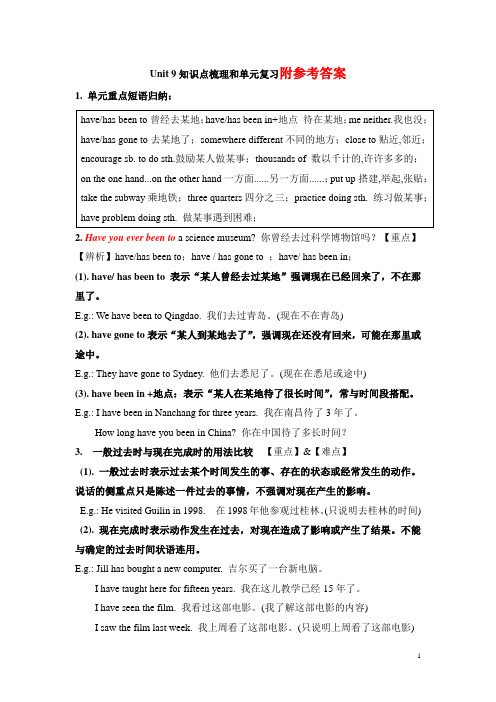
Unit 9知识点梳理和单元复习附参考答案1. 单元重点短语归纳:have/has been to曾经去某地;have/has been in+地点待在某地;me neither.我也没;have/has gone to去某地了;somewhere different不同的地方;close to贴近,邻近;encourage sb. to do sth.鼓励某人做某事;thousands of 数以千计的,许许多多的;on the one hand...on the other hand一方面......另一方面......;put up搭建,举起,张贴;take the subway乘地铁;three quarters四分之三;practice doing sth. 练习做某事;have problem doing sth. 做某事遇到困难;2. Have you ever been to a science museum? 你曾经去过科学博物馆吗?【重点】【辨析】have/has been to;have / has gone to ;have/ has been in;(1). have/ has been to 表示“某人曾经去过某地”强调现在已经回来了,不在那里了。
E.g.: We have been to Qingdao. 我们去过青岛。
(现在不在青岛)(2). have gone to表示“某人到某地去了”,强调现在还没有回来,可能在那里或途中。
E.g.: They have gone to Sydney. 他们去悉尼了。
(现在在悉尼或途中)(3). have been in +地点:表示“某人在某地待了很长时间”,常与时间段搭配。
E.g.: I have been in Nanchang for three years. 我在南昌待了3年了。
How long have you been in China? 你在中国待了多长时间?3. 一般过去时与现在完成时的用法比较【重点】&【难点】(1). 一般过去时表示过去某个时间发生的事、存在的状态或经常发生的动作。
Unit 9单元知识点人教版八年级英语下册
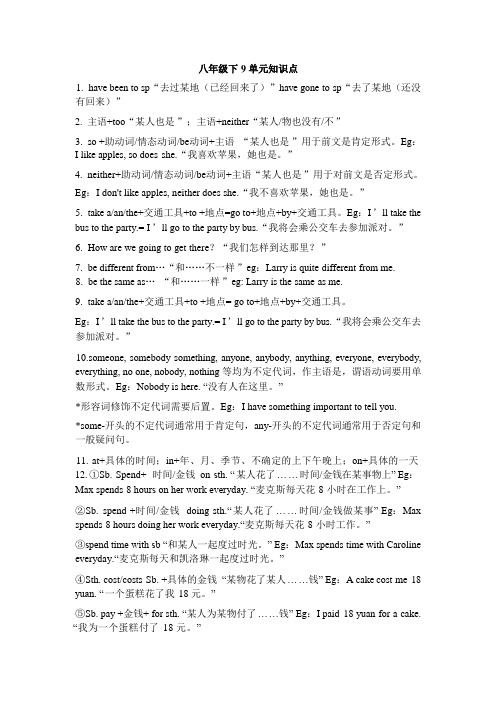
1. have been to sp“去过某地(已经回来了)”have gone to sp“去了某地(还没有回来)”2. 主语+too“某人也是”;主语+neither“某人/物也没有/不”3. so +助动词/情态动词/be动词+主语“某人也是”用于前文是肯定形式。
Eg:I like apples, so does she.“我喜欢苹果,她也是。
”4. neither+助动词/情态动词/be动词+主语“某人也是”用于对前文是否定形式。
Eg:I don't like apples, neither does she.“我不喜欢苹果,她也是。
”5. take a/an/the+交通工具+to +地点=go to+地点+by+交通工具。
Eg:I ’ll take the bus to the party.= I ’ll go to the party by bus.“我将会乘公交车去参加派对。
”6. How are we going to get there?“我们怎样到达那里?”7. be different from…“和……不一样”eg:Larry is quite different from me.8. be the same as… “和……一样”eg: Larry is the same as me.9. take a/an/the+交通工具+to +地点= go to+地点+by+交通工具。
Eg:I ’ll take the bus to the party.= I ’ll go to the party by bus.“我将会乘公交车去参加派对。
”10.someone, somebody something, anyone, anybody, anything, everyone, everybody, everything, no one, nobody, nothing 等均为不定代词,作主语是,谓语动词要用单数形式。
人教版英语八年级下册单元Unit 9 知识点+测试卷+思维导图
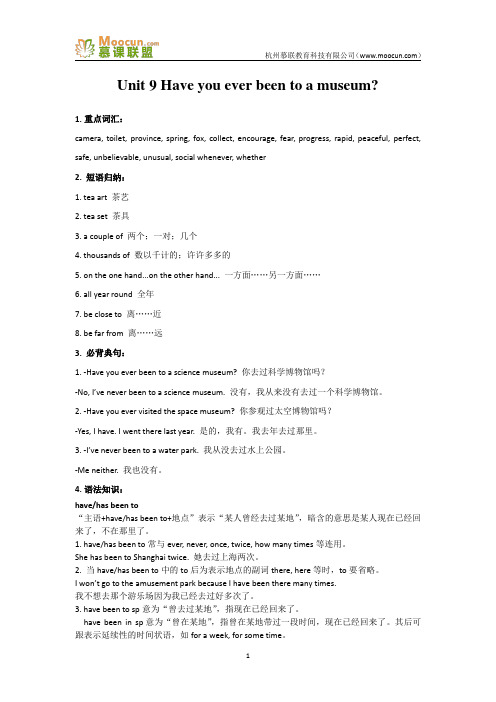
Unit 9 Have you ever been to a museum?1.重点词汇:camera, toilet, province, spring, fox, collect, encourage, fear, progress, rapid, peaceful, perfect, safe, unbelievable, unusual, social whenever, whether2. 短语归纳:1. tea art 茶艺2. tea set 茶具3. a couple of 两个;一对;几个4. thousands of 数以千计的;许许多多的5. on the one hand...on the other hand... 一方面……另一方面……6. all year round 全年7. be close to 离……近8. be far from 离……远3. 必背典句:1. -Have you ever been to a science museum? 你去过科学博物馆吗?-No, I’ve never been to a science museum. 没有,我从来没有去过一个科学博物馆。
2. -Have you ever visited the space museum? 你参观过太空博物馆吗?-Yes, I have. I went there last year. 是的,我有。
我去年去过那里。
3. -I’ve never been to a water park. 我从没去过水上公园。
-Me neither. 我也没有。
4.语法知识:have/has been to“主语+have/has been to+地点”表示“某人曾经去过某地”,暗含的意思是某人现在已经回来了,不在那里了。
1. have/has been to常与ever, never, once, twice, how many times等连用。
初中英语八年级下册Unit9单元复习+讲义 (1)

12.thousands of 数以千计的,许许多多的 13.on the one hand…on the other hand… 一方面……另 一方面…… 14.more than=over 超过 15.three quarters 四分之三 16.an English-speaking country 一个说英语的国家 17.whether…or… 不管……还是…… 18.all year round 全年;一年到头 19.have problems (in) doing sth 做某事有困难 20.choose to do sth 选择做某事 21. be close to 离……近 22. be far from 距……远
everywhere 意为“所有地方;到处;处处”
I've seen the book somewhere before. 我以前在什么地方看见过这本书。 I can't see it anywhere.我哪儿也看不到它。 There was nowhere for me to sit.我无处可坐。 Everywhere we went was full of tourists. 我们所到之处游客人头攒动。
重要知识点
1.somewhere是地点副词,somewhere different表示“某个 不同的地方”;somewhere和复合不定代词类似,当形容词 修饰它时,形容词常常放在其后。 I don't like this place.Let's go somewhere warm. 我不喜欢这个地方。我们去个暖和的地方吧。
(2018河北石家庄赵县期末)Our teacher encouraged u
s
hard.
人教版英语八年级下册单元Unit 9 知识点+测试卷+思维导图

Unit 9 Have you ever been to a museum?1.重点词汇:camera, toilet, province, spring, fox, collect, encourage, fear, progress, rapid, peaceful, perfect, safe, unbelievable, unusual, social whenever, whether2. 短语归纳:1. tea art 茶艺2. tea set 茶具3. a couple of 两个;一对;几个4. thousands of 数以千计的;许许多多的5. on the one hand...on the other hand... 一方面……另一方面……6. all year round 全年7. be close to 离……近8. be far from 离……远3. 必背典句:1. -Have you ever been to a science museum? 你去过科学博物馆吗?-No, I’ve never been to a science museum. 没有,我从来没有去过一个科学博物馆。
2. -Have you ever visited the space museum? 你参观过太空博物馆吗?-Yes, I have. I went there last year. 是的,我有。
我去年去过那里。
3. -I’ve never been to a water park. 我从没去过水上公园。
-Me neither. 我也没有。
4.语法知识:have/has been to“主语+have/has been to+地点”表示“某人曾经去过某地”,暗含的意思是某人现在已经回来了,不在那里了。
1. have/has been to常与ever, never, once, twice, how many times等连用。
人教版新目标八年级英语下册Unit9期末复习题(有答案)

人教版新目标八年级英语下册Unit9期末复习题一、单词拼写1.Can you tell me where the public(厕所)are?2.Mr.Wu talked about some(社会的)problems.3.My father often(鼓励)me to work hard.4.His grandfather enjoys(收集)different kinds of kites.5.Practice makes(完美的),as the famous saying goes.6.This kind of birds used to appear unexpectedly,but(主要地)during the winter.7.Most people(害怕)death.8.We should take the treasure away to a(安全的)place.9.Several(日本人)visited our school last week.10.I think(春天)is the best season of a year.11.As the famous saying goes:Practice makes p.12.Uncle Wang often c stamps.It's his hobby.13.In s,nature wakes up from her long winter sleep.14. Many foreigners are surprised at the r development of China in recent years.15.The street is not s for children to play because there are too many cars.二、词形变化1.Kate(feed)the dog already,but she(not water)the flowers yet.2.A couple of Germans(take)me for a ride several times since I came to Germany.3.Daniel never(be)to Australia.He wants to go there with Millie.4.—I've bought a new cellphone,—Where you(buy)it?5・一Where is your mother?一She(go)to Shanghai with Uncle Li.She(come)back in three days.6.The old man loves living in the(peace)countryside.7.Would you like to come and see her(perform)in the school hall tonight?8.The house(it)is very beautiful.st week I had an(usual)experience in Hong Kong.10.It often takes a few days of(prepare)before my birthday party.11.The best time(come)to Harbin is in winter.12.It's not(simple)a question of money.13.Tina likes(India)food very much.14.You can come(when)you are free.I'll wait for you all the time.15.Let's go to the zoo to watch monkeys,tigers,(fox)and other animals.16.Have you ever(see)Disney movies?17.I've been to Shanghai on business,but there(be)too many people then.18.Tom(travel)to Mount Tai in Shandong twice.19.I saw Andy(shop)in the big mall on my way home.20.Ted(wash)the car,so it's very clean now.21.I find it(believe)that such a young lady can climb up that mountain without help.22.We felt relaxed and(peace)during the days in the mountains.23.My brother Jack likes(India)food,but I like Chinese food better.24.We should organize more(society)events.25.You can enjoy all the water sports,or you can also(simple)lie on the beach.三、句型短语1.很难相信他这一学期进步得如此迅速。
八年级英语下册 Unit 9 Have you ever been to a museum复习 (新版)人教新目标版

Unit 9 Have you ever been to a museum?默写1 Section A 1a~2d一、默写课文中的单词。
1. 照相机;摄影机;摄像机 ______2. amusement n. ______3. somewhere adv. ______4. invention n. ______二、默写课文中的短语。
1. 游乐场 ______2. 去过 ______3. 科学博物馆 ______4. 某个不同的地方 ______5. 太空博物馆 ______6. 玩得很开心 ______7. 了解;获知 ______ 8. 彩色电影 ______9. 电影摄像机 ______ 10. 搭建 ______三、根据汉语提示完成下列句子。
1. 你曾经去过一家科学博物馆吗?______ you ______ ______ ______ a science museum?2. 弗兰克在水上公园玩得很开心。
Frank ______ ______ ______ ______ at the water park.3. 约翰从没有去过太空博物馆。
John ______ ______ ______ ______ the space museum.4. 你曾经去过那儿吗?Have you ever ______ ______ ?5. 它是一个度过周六下午的好方式。
It’s a great way ______ ______ a Saturday afternoon.6. 我还了解一些发明,它们成就了彩色电影。
I learned about the inventions that ______ ______ color movies, too.7. 我从未野营过。
I’ve never ______ ______ .知识积累somewhere与 anywhere的用法辨析:相同点:都表示“在某处”。
不同点:somewhere多用于肯定句中;anywhere多用于疑问句和否定句中。
人教版八年级英语下册Unit9知识点归纳

人教版八年级英语下册Unit9知识点归纳Unit 9: Have you ever been to a museum。
Knowledge Points Summary1.Key Phrases:At night: during the nightIn a more natural environment: in a setting that is more naturalAll year round: XXXXXX: XXXIn the dark: in a place without lightIn the past: in us timesHave been to: visited a placeScience museum: a museum focused on scienceHistory museum: a museum focused on historyXXX park: XXXGo XXX: visit a place that is not familiarGo skating: ice skateTake the subway: XXX systemA great way to XXXAll the old movie cameras: all the antique movie cameras Learn about something: gain knowledge about a topic On the weekend: during the weekendXXX: sleep in a tent in the mountainsPut up a tent: assemble a XXXIn such a rapid way: in a very fast mannerDifferent kinds of: us types ofDevelopment of toilets: the progress of XXXSocial groups: XXXXXX XXX: XXXMake a perfect cup of tea with beautiful tea sets: XXXA nice place to XXXXXX of: many。
- 1、下载文档前请自行甄别文档内容的完整性,平台不提供额外的编辑、内容补充、找答案等附加服务。
- 2、"仅部分预览"的文档,不可在线预览部分如存在完整性等问题,可反馈申请退款(可完整预览的文档不适用该条件!)。
- 3、如文档侵犯您的权益,请联系客服反馈,我们会尽快为您处理(人工客服工作时间:9:00-18:30)。
现在完成时态常见标志词 1. already(已经), just(刚刚), never(从未/ 从没有), ever(曾经), yet(仍然/还), before(以前(句尾时) 2. since+点时刻或从句; for+段时间; how long (疑问句中用来提问since/for短语的) 3. so far;till now;by now(到目前为止;迄今) 4. recently近来in the past/last+段时间 在过去的 几年中 5. once(一次),twice, three(four…) times 6. It is the+最高级+n.+ (that) sb.have ever done
现在完成时句型举例: 1. Have you ever been to an amusement park? 你曾经去 过游乐园吗?Yes, I have./ No, I haven’t. 2. I have never been there. Me neither=Neither have I. 我也没有. 3. Where is he? He has gone to the Beijing. 4. How long has he been in Beijing? (不能come/arrive) 5. I’ve never been to an aquarium. 我从没去过水族馆. 6. I have been a student here for a year. 我成为这的学 生有一年了. (不能用become) =I became a student here a year ago. 7. He has been dead for two years.(不能用die)=he died two years ago. 8. I have been a teacher since ten years ago(for ten years.) (不能用become)9. I havejust/ever/already/never seen the movie. Have you
a relaxing and peaceful place 一个令人放松并且宁静的地方 tea art performances茶艺表演 make a perfect cup of tea沏一杯完美的茶 tea sets茶具 a couple of times两次 a boat ride乘船(名词短语) take a ride on the boat乘船(动词短语) in Southeast Asia在东南亚
41. Have you ever been to an a_______ (娱乐) park? 42. The International Museum of Toilets is a very u_______ (不寻常的) museum. 43. There are some special German p_______(油画) in the art museum. 44. W_______ (不管---还是)it is rainy or not, we should go to school on time. 45.There are four seasons in a year.S_______(春季)comes after winner. 46.The Hangzhou National Tea Museum is a relaxing and _______(peace) place . 47.Mr.Li often _______(encourage) us to think about ways to improve our studies. 48. Have you ever tried _______ (Japan) food? 49. My grandpa loves drinking tea and _____ (collect)tea sets. 50. Have you ever ____(hear) of the Night Safari in Singapore?
Most large cities have zoos, but have you ever been to a zoo at night?大多数的大城市都有动物园,但是,你曾 经晚上去过动物园么? However, if you go to see lions, tigers or foxes during the daytime, they’ll probably be asleep!然而,假如你白天 去看狮子,老虎或狐狸,也许它们都在睡觉。 A lot of animals only wake up at night, so this is the best time to watch them.许多动物都在晚上醒来,所以这是 一个观看它们的最好时机。 This is because the island is so close to the equator.这是 因为这个岛如此接近赤道。 So you can choose go to whenever you like--- spring, summer, autumn or winter.所以你可以选择你喜欢的任 何时间去,春天,夏天,秋天或冬天。
必背句子 I learned about the inventions that led to color movies, too. 我还了解了一些发明,它们成就了彩色电影。 It’s unbelievable that technology has progressed in such a rapid way!技术以如此迅速的方式进步真是令 人难以置信。 I wonder how much more computers will be able to do in the future.我想知道,未来计算机还能做多少 工作呢。 I just couldn’t believe my eyes when I saw so many different kinds of toilets there.当我在那儿看到如此 多不同种类的马桶时,我不能相信自己的眼睛。
Watching the tea preparation is just as enjoyable as drinking the tea itself.观看泡茶过程与喝茶本身一样 让人愉快。 In Singapore, however, you’ll find a lot of food from China; you won’t have any problem getting rice, boodles or dumplings.然而,在新加坡,你会发现许 多中国食物;在那里,吃米饭,面条和饺子一点都 不成问题。 Whether you like Indian food, Western food or Japanese food, you’ll find it all in Singapore!无论你喜 欢印度食品,西方食品还是日本食品,在新加坡, 你都会找到。
1.现在完成时态表示过去发生的动作对现在造成的影响或 结果。本时态标志词: already (“已经”,用于肯定句中,放在have /has之后或 句尾); yet (“仍然”“还”,用于疑问句或否定句的句 尾) just(“刚刚”,放在have /has之后); before(“以前”,放在句尾); ever(“曾经”,放在have /has之后) never (“从没有”,在have /has之后) 2.某个动作从过去已经开始,一直持续到现在,还有可能持 续到将来.动作的持续性要通过一段时间来表示一段时间 的表达方法有两种: for: +一段时间 for two weeks for three years Since +过去的某一时刻, since nine since last week Since +一般过去时态的时间状语从句 since you came ; since you got home.
1.直接用延续性动词 buy– have;catch(get) a cold –have a cold;borrow— keep;become—be;put on-- wear 2.转换成be+名词 join the army – be a soldier;join the Party –be a Party member; go to school– be a student 3转换成be+形容词或副词 die—be dead;finish – be over;begin—be on;leave— be away ; fall sleep – be asleep close – be closed come to/ go to/arrive at(in)+某地—be in(at) +某地 4.转换成 be+介词短语go to school– be in school ; get up_ be up;
three quarters 四分之三 right now 现在;目前 an amusement park with a special theme一个有特 别的主题的游乐园 walk around the park 在公园里到处走 hear of 听说 social groups 社会团体 in such a rapid way 以如此迅猛的方式 different kinds of各种各样的 development of toilets 厕所的发展 go somewhere different 去不同的地方 in the past 在过去 be far from 离……远 in the dark 在黑暗中 another province另一个省
thousands of …许多…,成千上万的… take a holiday度假 on the one hand…, on the other hand…. 一方面…, 另一方面… an English-speaking country 一个说英语的国家 all year round全年 during the daytime在白天 be close to…与…关系很亲密,离…很近 camp in the mountains在山中野营 a nice place to enjoy tea 一个品茶的好地方
